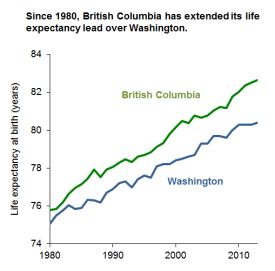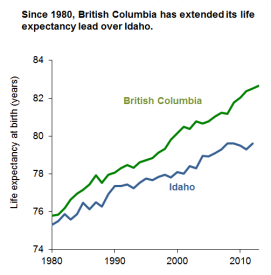Life expectancy reached a new high in both British Columbia and in Washington last year. That’s good news, since it means that the residents of both jurisdictions are living longer, healthier lives.
In one way of looking at things, the news comes as no surprise. Lifespans through much of the industrialized world have increased fairly steadily since the end of World War II, so record-breaking years are now more the rule than the exception.
 But what’s genuinely interesting is that life expectancy is rising much faster in some places than in others. As of 1980, for example, lifespans in Washington and British Columbia were nearly in a dead heat: 75.1 years for Washington, 75.8 for BC. Yet since then, BC has pulled ahead. By 2013, lifespans in BC had reached 82.7 years, compared with just 80.4 years in Washington—a gap of 2.3 years, which is wider than at any point since Washington began annual reporting of life expectancy statistics.
But what’s genuinely interesting is that life expectancy is rising much faster in some places than in others. As of 1980, for example, lifespans in Washington and British Columbia were nearly in a dead heat: 75.1 years for Washington, 75.8 for BC. Yet since then, BC has pulled ahead. By 2013, lifespans in BC had reached 82.7 years, compared with just 80.4 years in Washington—a gap of 2.3 years, which is wider than at any point since Washington began annual reporting of life expectancy statistics.
is in much the same boat as Washington. Through the 1980s and early 1990s, lifespans in the Gem state matched or even exceeded Washington’s.  But in the late 1990s Washington began to pull ahead, and now enjoys a modest but steady life expectancy lead over its neighbor to the east. Meanwhile, British Columbia has pulled even farther ahead of Idaho, and now enjoys a life expectancy lead of almost three years.
But in the late 1990s Washington began to pull ahead, and now enjoys a modest but steady life expectancy lead over its neighbor to the east. Meanwhile, British Columbia has pulled even farther ahead of Idaho, and now enjoys a life expectancy lead of almost three years.
Many people instinctively distrust the idea that longer lives mean better health. The idea of extending lifespan can conjure up images of keeping brain-dead patients on life support—of doctors feverishly laboring merely to prolong a body’s existence, rather than improving life’s quality. Yet across nations and over time, longer life expectancy typically means more years lived in good health and free of disability. In fact, public health researchers have developed measures of life expectancy adjusted for health and disability—and while these gauges don’t move in lock-step with plain-vanilla life expectancy, it’s clear that adding years to life typically means boosting the quality of life as well as its quantity.
So the fact that BC residents live longer probably means that they also spend more time in good health. And it also means that overall health has been improving faster for residents of the province than for its neighbors directly to the south.
Why is that? BC’s decades of universal health insurance almost certainly play a role. But BC has other public health advantages, including lower rates of smoking, obesity, car crashes, and suicide. And underlying many of these trends, Canadian income inequality—while relatively high by international standards—is still lower than in the US. Economic inequality is tightly correlated with poor health, as well as other adverse social outcomes.
In short, BC has a number of small health advantages that add up to a two- to three year life expectancy advantage over the jurisdictions just to the province’s south. And that suggests that any systematic look at how to improve health in US states ought to look not only inward, but also outward—and examine not only what we’re doing wrong, but also what other parts of the world are doing right.


Comments are closed.